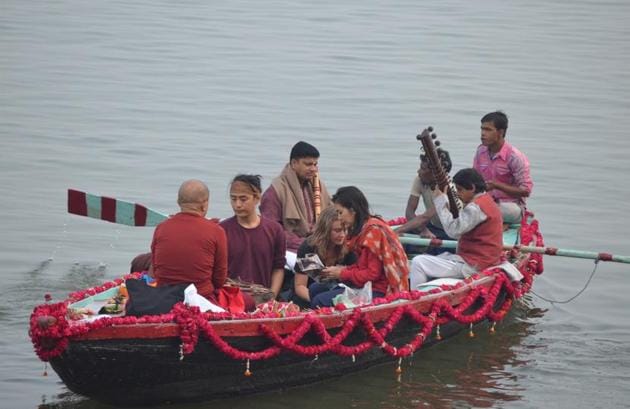Where tunes go with the flow: Live music on boats enriches tourists’ experience of Subah-e-Banaras
Musicians and boatmen have come up with this innovative way to draw more tourists to the ghats for Kashi’s magical sunrise, known as Subah-e-Banaras.
Local musicians play classical tunes on a boat carrying foreign tourists from Dashashwamedh Ghat early in the morning as the visitors enjoy the beauty of Varanasi’s famed riverfront.

Musicians and boatmen have come up with this innovative way to draw more tourists to the ghats for Kashi’s magical sunrise, known as Subah-e-Banaras. Each ride takes an estimated 90 minutes, spanning the length of Varanasi’s unbroken chain of ghats.
Shivkumar Shukla, a local tabla player involved in the venture, says, “I have performed on a boat on the Ganga on several occasions in the past. But playing the tabla among foreign tourists is an entirely new experience. We have thought of this way to make the foreigners’ visit memorable.”
The tourists get to choose from a combination of tabla-sitar, flute-sitar, flute-tabla and tabla-flute, sitar and harmonium.
Shukla says the innovation introduced a few months ago is attracting many tourists, including domestic ones. While many tourists prefer sitar, others ask for a combination of tabla and sitar, or sitar and flute. The artistes are roped in accordance with the demand of the tourists. Dhruv Kumar Mishra, another local musician, plays the sitar.
“As tourists board the boat, I start playing tabla and Atul Kumar plays flute. The boat moves along the river slowly as the tourists look at the ghats, enjoying and applauding the tunes,” Shukla adds.
A musical ride on a small boat with five people costs Rs 7,000, Rs 11,000 on a medium-sized boat and Rs 15,000 for a large boat. The tourists usually book an entire boat. The cost per person comes to Rs 1100.
Francoise Sutra, a French tourist, says, “It is a wonderful experience. Great tunes, great ghats.” Many other tourists react in a similar way.
Because of the innovation, the tourists now prefer manual boats to diesel engine ones.
“Tourists now take manually operated small boats, which are noiseless, to enjoy Subah-e-Banaras and listen to live classical tunes. Diesel boats make a lot of noise and emit fumes,” Shukla says.
With the trend expected to catch on, the income of small boat operators will increase.
“Boating with live classical tunes of flute and tabla is really a great experience. I never thought of such a mind blowing experience during my trip to Varanasi,” Ravi Kumar, a resident of Mumbai, says. He was delighted to know that he can enjoy live classical tunes while boating.
Vinod Nishad aka Guru, president of the Maa Ganga Nishadraj Association (organisation of boatmen), has played a crucial role in the new initiative.
“We have received a very good response. Foreign tourists like it. They are overjoyed when they come to know that they will get a chance to enjoy the classical tunes,” he says.
He gets in touch with hotels and makes arrangements according to the demands made by the tourists.
Another boatman Prabhu Manjhi, who also ropes in the artistes, says, “If tourists demand live music while boating, we bring the artistes. They play instruments and tourists enjoy the boat rides and the scenic view of the ghats, stretched over seven and a half kilometres.”
Gunjan Kumar, a resident of Patna, says: “I saw a group of tourists enjoying live tunes on boats. This is a new beginning. When I visit the city the next time, I would like to experience boating while listening to classical tabla and flute tunes.”





